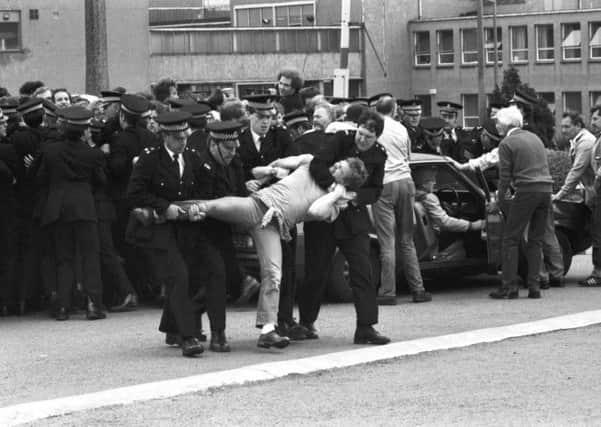Miners to tell of strike experiences at public meeting


Former miners and people from mining communities are being invited to share their experiences and reflections as part of an independent review set up by the Scottish Government.
Human rights lawyer, solicitor-advocate John Scott QC, who is leading the review, said there had been a good response to their invitation for written submissions – from both the mining and the police sides.
Advertisement
Hide AdAdvertisement
Hide AdBut he and his advisory panel also wanted to go to affected communities to hear what people had to say.
Four meetings have been announced across Scotland, including one at the National Mining Museum, Lady Victoria Colliery, Newtongrange, on Wednesday November 21, between 6pm and 9pm, with doors opening at 5.30pm.
The independent review of the impact of policing on mining communities in Scotland during the year-long strike was announced in June.
Mr Scott’s panel is made up of Jim Murdoch, professor of public law at Glasgow University; Kate Thomson, former assistant chief constable; and Dennis Canavan, former MP and MSP.
Advertisement
Hide AdAdvertisement
Hide AdMr Scott said the call for written evidence, which was made in September and runs until the end of November, was expected to provide the bulk of the accounts from those affected. But he went on: “The public meetings are important so it’s not a question of some review sitting back in Edinburgh and not going out and trying to engage with people. We’re encouraging people to come along and share their experience. It doesn’t need to be people who were miners, it can be their families, children or others in the community who were affected by it.”
The review has also been looking at public records, including Cabinet Office papers, from the time and meeting academics who have studied the strike.
Mr Scott said the review was in two parts. He has to submit an interim report to the Justice Secretary in January. “By that stage we will have a better idea of what evidence we have had, do we need anything else, do we want to focus on specific questions arising out of what we have heard. The second half will be considering the evidence and writing the report.”
Midlothian Labour MP Danielle Rowley urged people affected by the strike to have their say. She said: “The suffering inflicted upon mining communities like ours can never be reversed, but at the very least the miners and their families deserve liberation through truth. Questions regarding police tactics during the strike must be answered. I urge anyone affected to attend this event or to submit their evidence to the review to make their voice heard.”